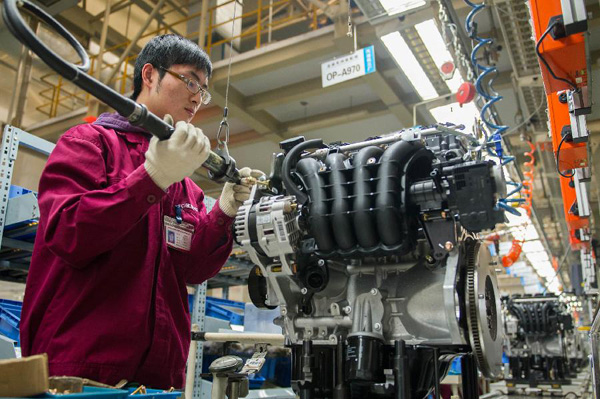 |
| (Xinhua File Photo) |
BEIJING, Dec. 1 -- China's purchasing managers' index (PMI) for the manufacturing sector remained flat at 51.4 percent in November, according to new data released Sunday.
The figure was the same as October, data from the National Bureau of Statistics (NBS) and China Federation of Logistics and Purchasing showed.
Manufacturing PMI has stablized after rising for four consecutive months, showing a steady upward trend in manufacturing. A figure above 50 percent signals expansion.
Zhao Qinghe, a senior NBS statistician, attributed the strong PMI to expanding production, and confidence boosted by government measures to stabilize growth and restructure the economy, as well as large-scale enterprises' active performance.
The sub-index for production rose for a fifth month to 54.5 percent, up 0.1 percentage points from October.
As production picked up, companies also bought more raw materials, driving the sub-index for materials up 0.9 percentage points to 53.6.
Zhang Liqun, a researcher with the Development Research Center of the State Council, also said the November figure confirmed the stabilizing trend of the country's economic growth.
China's gross domestic product (GDP) expanded by 7.7 percent in the first nine months, which is higher than the government's full-year target of 7.5 percent. GDP growth in the third quarter accelerated to 7.8 percent from 7.5 percent in the second, NBS data showed.
The new PMI figure was higher than that of HSBC's flash PMI for last month, which declined to 50.4 from 50.9 on weaker new orders.
"Judging from the situations of investment, export and consumption, the economy has stabilized with steady growth," Zhang said.
But experts also pointed out that the foundation for future stable growth needs to be further consolidated.
"Although the manufacturing PMI has stablized after it rose for a fourth month, forces that drove up the index were not balanced and the foundation not solid enough, as sub-indices other than production were relatively weak," according to Zhao Qinghe.
The NBS sub-index for raw material inventories was 47.8 percent, dropping by 0.8 percentage points compared with last month and small businesses fell for a fourth month, both of which are still under 50 percent.
"The falling raw material inventory showed lukewarm market demand, and Chinese manufacturers remained cautious about future market prospects," said Liu Ligang, chief Greater China economist at ANZ Banking Group.
The sub-index for new orders dropped 0.2 percentage points to 52.3 percent, widening the gap to 2.2 percentage points with that of production, showing imbalanced supply and demand.
Meanwhile, the figures pointed to the hardship of small Chinese companies.
A breakdown by company size shows that PMI for large enterprises rose to 52.4 percent in November, PMI for medium-sized firms remained flat at 50.2 percent, while that for small manufacturers fell for the fourth month to 48.3 percent.
Although the recently released reform agenda boosted market sentiment, continued tight capital liquidity may dampen market confidence for further investment, Liu said.
Chang Jian, economist with Barclays, believed there will be a softening momentum for economic growth in the fourth quarter of the year, partly due to the drop of indices for new orders.
"Rather than bottoming out, we look for slower growth in the coming quarters," according to Chang.
She forecast economic growth to slow to 7.2 percent in 2014 from a possible 7.7 percent this year.
 Heavy cargo flights taking off
Heavy cargo flights taking off In pictures: PLA's digital equipment
In pictures: PLA's digital equipment  Americans mark Thanksgiving Day with parades
Americans mark Thanksgiving Day with parades Self-made farmer billionaire donates 69 villas at hometown
Self-made farmer billionaire donates 69 villas at hometown Demolition of bizarre rooftop villa in Beijing still in progress
Demolition of bizarre rooftop villa in Beijing still in progress Service seminar for E China train attendants
Service seminar for E China train attendants  Supermodel-turned-designer
Supermodel-turned-designer Cheerleaders light up CBA regular season
Cheerleaders light up CBA regular season  Finland--anytime you want is right time to go: Ambassador
Finland--anytime you want is right time to go: Ambassador Youths in Night club: photo story
Youths in Night club: photo story Models dazzle at Int'l Yacht Model Pageant
Models dazzle at Int'l Yacht Model Pageant  How to apply for a green card in China
How to apply for a green card in China Selected sports photos of the week
Selected sports photos of the week Annual Santa Claus parade held in Canada's Montreal
Annual Santa Claus parade held in Canada's Montreal China's aircraft carrier passes through Taiwan Strait
China's aircraft carrier passes through Taiwan StraitDay|Week|Month